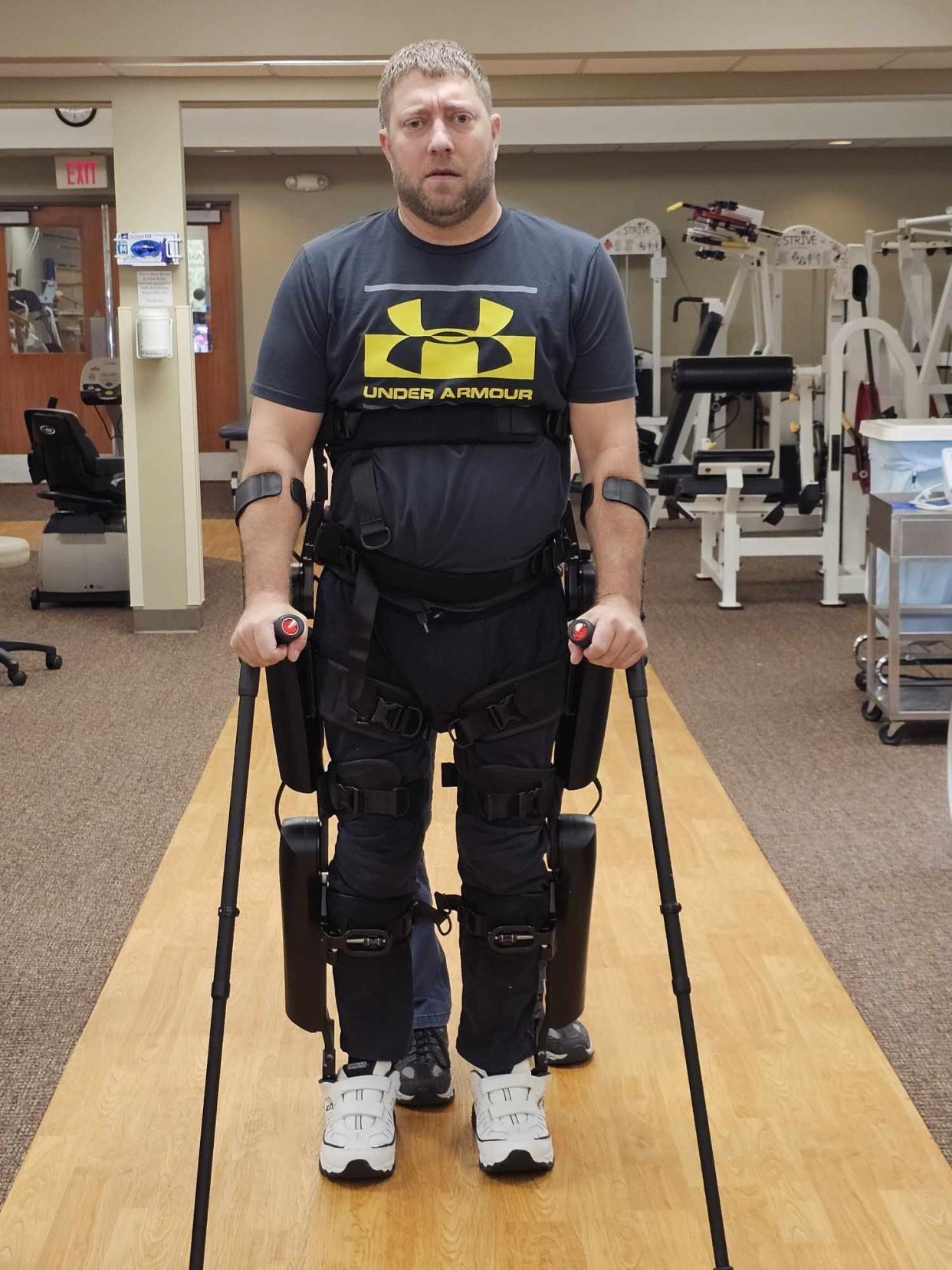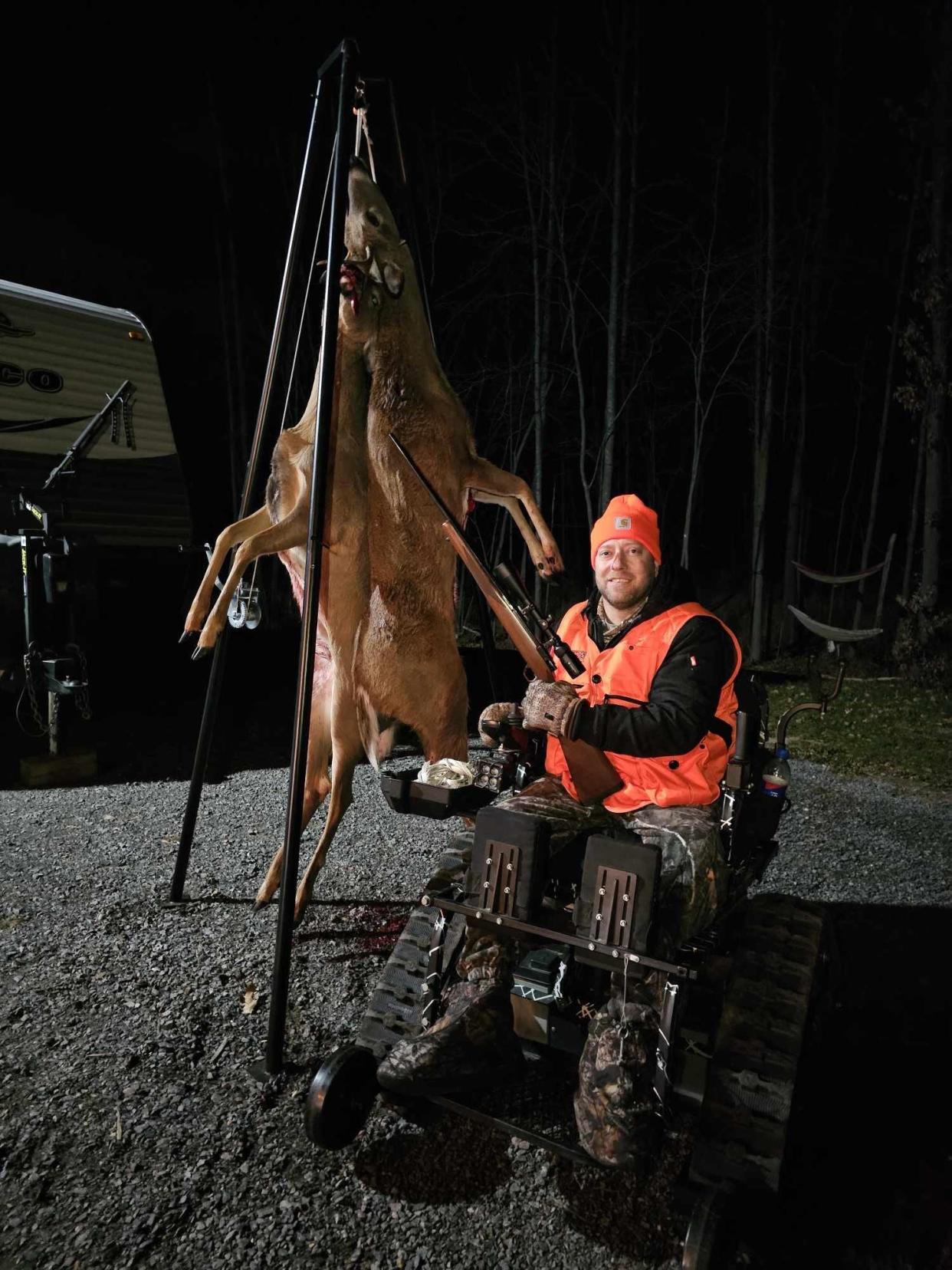Brian Ortner, Solarus lineman paralyzed by a falling tree, uses an exoskeleton to walk
TOWN OF LINWOOD - The steps are halting, awkward and short, each movement punctuated by the whining sounds of electric motors.
Brian Ortner, who has been paralyzed from the chest down since July 20, 2019, has been using the Rewalk Robotics exoskeleton since the end of September. The exoskeleton is a wearable device that allows people with paraplegia to stand, walk and step up curbs and stairs. Sensors and motors power Brian's hips, knees and ankles. He initiates steps by tilting his upper body.
He balances using a pair of crutches, and even though the movement Brian uses to activate the machine is subtle, the entire endeavor is grueling and leaves him exhausted. He trains using the exoskeleton with the help of therapists twice a week. It all requires so much focus that Brian said sometimes he has to remember to breathe.

"It's the best cardiovascular workout I can do," he said.
The physical fitness benefits are the primary reasons to use the exoskeleton, Brian said. In addition to giving him a cardiovascular workout, standing and moving upright helps him diminish the effects of the osteoporosis that has weakened the bones of his lower body. Standing also helps him deal with the gastrointestinal issues he's experienced since he was injured.
"I guess standing upright and walking jiggles things into place," Brian said. "I feel a lot less bloated."
The fitness benefits are terrific, but there's also an unmeasurable value to how taking those few halting steps are lifting his spirits.
Brian suffered the paralyzing injury to his spinal cord when he was working as a lineman for Solarus, a Wisconsin Rapids-based internet, phone and cable television company. Brian was part of an army of workers who were cleaning up debris from a storm that swept through central Wisconsin. He was cutting down a splintered tree that fell in a way that he couldn't predict, and it hit him in his back as he was sprinting away from it.
He underwent life-saving surgeries and spent weeks at Craig Hospital in Denver, Colorado, a highly-ranked facility that specializes in rehabilitation and research for people with spinal cord and brain injuries. Through it all, Brian embraced the specialized equipment and technology that today allows him to be as active as possible: a pickup truck that's modified so he can drive with his hands (and a small crane in the bed that stows his wheelchair); and a tracked, all-terrain wheelchair that allows him to roam.

Brian, his wife, Amy, and their two children, Aubrey, 14, and Bennett, 12, had to leave a home they loved, a decidedly inaccessible Victorian home in Vesper. They had a new home built with wheelchair-friendly designs that gives Brian as much freedom as possible. The home sits on several acres of wooded property between Wisconsin Rapids and Stevens Point.
Shortly after Brian's accident, Amy and a couple of other family members created a GoFundMe to raise money for his recovery. That fund raised more than $126,000, which helped the Ortners offset the costs of the adaptive equipment and building a different life.
Both Brian and Amy say they are deeply grateful for the community's help. But rebuilding a life isn't easy, and Amy said that last year, the third one after her husband's injury, was the most difficult. There's still grief over what they both lost.
The first two years they were so busy dealing with all the emergencies that they didn't have time to dwell on what was happening. But after they settled into their new home, they finally had the time to deal with the long-term implications of Brian's life-changing injury.
Brian grew up as a farm kid, and he loved working outside, not only for his job, but as way of life. He's a putterer, a guy who is happiest when he is alone, working with tools on a task. And while he still could do a lot of that from a wheelchair, there would be and still are times when his frustrations would boil over.
The victories, such as being able to go camping as a family, could be tarnished by Brian's impatience with his limitations. Amy tells the story about how it became her job to attach the kids' bikes to the camper, while Brian oversaw her work. He shook his head at her efforts, she said, and told her "it's like getting injured all over again."
That was a joke, but at other times there was anger. Brian has never been one to ask for help, and he gets bitter when he can't do the things he wants to do. He started getting counseling, he said.
"They say I've got PTSD," he said, and he's taking medications for anxiety and depression. "I've learned that I've got to reframe a lot things."
Using the exoskeleton helps. Even taking a few steps with the help of Amy and physical therapists feels like a game changer, Brian said. He doesn't pin all his hopes on the idea that he'll use the exoskeleton to walk across his property. His injury is such that that kind of movement would be difficult. But he does keep the options open for advances in technology that could someday make that a reality.
He said he'd jump at the chance to test any new technologies or procedures that could help people with paralysis. But for now, he's just intent on taking one step at a time.
Keith Uhlig is a regional features reporter for USA TODAY NETWORK-Wisconsin based in Wausau. Contact him at 715-845-0651 or kuhlig@gannett.com. Follow him at @UhligK on X, formerly Twitter, and Instagram or on Facebook.
This article originally appeared on Green Bay Press-Gazette: Brian Ortner, paralyzed in 2019, walks using robotic exoskeleton
